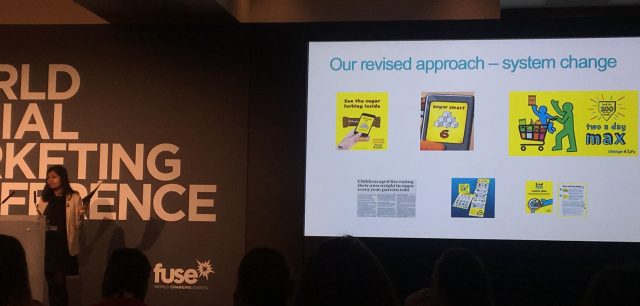Changing individuals’ behaviours is not enough – We need to change the system

Last week I attended the World Social Marketing Conference in Edinburgh, where Public Health England presented their flagship behaviour change campaign for families, Change4Life.
It’s impressive. And it should be given its multi-million pound budget. But what was particularly striking was right at the end of their presentation when they explained ‘Our Revised Approach – System Change’.

Ann Don Bosco (Head of Strategy at Public Health England)
The presenter talked through Change4Life’s recent sugar smart campaign, a big multi-channel programme that persuades consumers to make healthier substitutions in their weekly shop, such as swapping full fat coke with diet coke.
The sugar smart campaign overtly aimed to increase individuals’ demand for, and consumption of, low sugar products. But what I wasn’t aware of is that PHE also engineered it to act as an important policy device. The sugar smart campaign sought to create compelling proof that there is strong desire among families to consume less sugar and make healthier choices.
Did it work?
Yes. Within weeks of launching, millions of people had downloaded PHE’s sugar smart mobile app and sales of healthier substitution products increased.

Why did this matter on a policy level? Because PHE wanted to show that consumers want change. The drive to reduce sugar in children’s diets isn’t simply being imposed on families by nannying kill-joys; it is something consumers really want to do.
The success of the sugar smart campaign helped offset the food industry’s resistance to change. PHE could use it to show that their customers’ needs and wants were changing. The campaign helped pave the way – politically – for government to take a more assertive stance with the food industry and change their behaviours. For example, through reformulating calorific products and reducing portion sizes.
What I think is genuinely new is PHE’s recognition that their public behaviour change campaign had to feed into their industry behaviour change campaign.
Public Health England (PHE) is all too aware that solely plugging away trying to change individuals’ food choices can only achieve so much. Ultimately, it will be changes to food products, changes to the way they are marketed and the introduction of attractive, healthier substitute products that will move the dial on obesity. These kind of changes to the food system work at scale and are lasting. They are getting to the root. In the long run they will be much more effective at reducing consumers’ calorific intake than any social marketing campaigns aimed at individuals’ food choices can ever hope to be.
This kind of joined up working – marketing dovetailing with policy – amounts to smart campaigning. This is world-class behaviour change.
—
Questions/comments? email ben@claremontcomms.com
